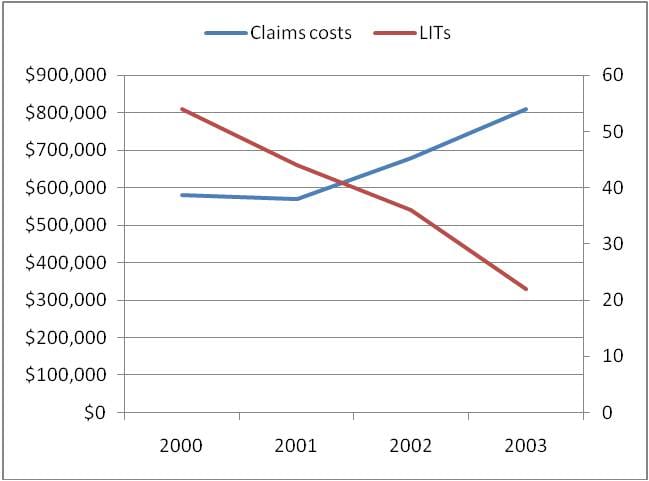Stamping out LTIs to post a profit

The 7.30 Report's “Australia Post's return to work strategy under scrutiny” (September 29 2009) looked at Australia Post's system of early intervention, with contrasting views on the success of the system from the employer and the union perspectives.
The report noted that workers' compensation costs at Australia Post have been significantly reduced; however, the union indicates return to work outcomes are at the expense of their members’ wellbeing. Australia Post noted Lost Time Injury (LTI) rates are down, the union felt strongly employees were being returned to inappropriate duties to bolster the key performance indicator outcomes of management.
First up, we applaud the 7.30 Report for addressing return to work issues. Even without the human cost of long term disability, the financial impact of work injuries is a major issue for an organisation’s bottom line. Every day in the media we see outrage about CEO salaries. Company profits may be improved by reducing CEO salaries, but they are likely to be improved far more by addressing the way work injuries are managed. The direct costs of work injuries are commonly 2-6% of payroll. Indirect costs are calculated to be 3 to 6 times the direct costs. These are big-ticket items and warrant far more public discussion than occurs.
And don’t get us started on the human cost...
Good evidence backs up the positive health outcomes resulting from early return to work. However, Australia Post’s main union, the CEPU, says return to work is occurring too early. At RTWMatters we consider that in vast majority of cases the employee should not be off work. But it’s not the speed of return that is important, it’s cooperation and having a good RTW plan that is vital. Putting someone back in a job without cooperation and support causes problems.
Some of our team have had first-hand experience with Australia Post’s return to work. In the select number of cases they have dealt with the Australia Post system has been found to be frustrating and seemingly lacking in genuine interest in the employee. Perhaps our team has seen only isolated examples, not representative of the general approach - if so our opinion may be swayed by the appropriate data.
Our experience is that the Australia Post system focuses on ‘process before people’.
And we reckon the pursuit of low LTI statistics is a major factor.
There are legions of corporate stories about reducing lost time injuries, some of the tales are legendary. We don’t say this lightly, but to highlight how common the problem of focusing on statistics ahead of people is, and how the game is played by some in the industry.
Bringing people in simply to complete paperwork, giving them safety videos to watch, or providing them with duties that are unproductive, are common tactics used to prevent lost time injuries.
People in the know are suspicious when LTIs are too low.
Senior managers have become familiar with lost time injuries as a statistic. Statistics are reviewed at management meetings, they are part of company key performance indicators (KPIs), because many believe LTIs provide a focus on safety. Indeed, LTIs may provide a focus on safety, but the downsides is that they can create an emphasis on statistical results rather than on people and positive health outcomes.
Employees know how management deals with them. As one clever human resources manager we know says, “You get the union you deserve.”
When management of an injury is about preventing a statistic that might damage a manager's key performance indicators, employees know what is going on. They become disenfranchised. Word spreads, they become cynical, and while there may be reduced lost time injuries, cooperation is lost.
In our experience when cooperation is lost people do return to work, but often under sufferance. Some cases remain off work for significantly longer than necessary. Alternatively people may come back on modified duties, but then fail to progress from modified duties back to their normal duties.
It is not uncommon to see the result illustrated in this graph, LTIs come down yet claim costs going up.

This is not the case at Australia Post, who report their premium has come down significantly. This means that their claims costs will also be down. With respect, however, RTWMatters suggests Australia Post may experience problems in other areas.
Systems that drive return to work are important. But putting process before people takes you only so far. If an organisation values performance indicators ahead of care for an employee in need, it is basically telling all of its employees that playing the numbers game is what wins the day. The negative consequences of that are real, not the least is a negative impact on corporate reputation.

